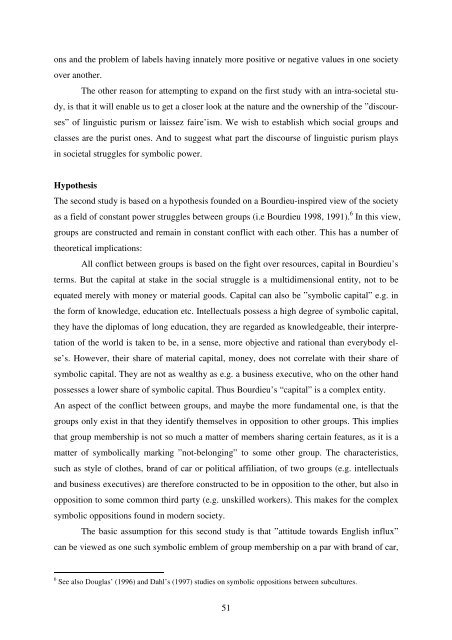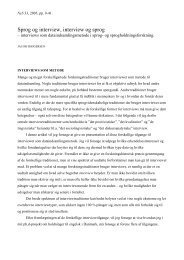Hør dog hvad de siger - Note-to-Self: Trials & Errors
Hør dog hvad de siger - Note-to-Self: Trials & Errors
Hør dog hvad de siger - Note-to-Self: Trials & Errors
Create successful ePaper yourself
Turn your PDF publications into a flip-book with our unique Google optimized e-Paper software.
ons and the problem of labels having innately more positive or negative values in one society<br />
over another.<br />
The other reason for attempting <strong>to</strong> expand on the first study with an intra-societal stu-<br />
dy, is that it will enable us <strong>to</strong> get a closer look at the nature and the ownership of the ”discour-<br />
ses” of linguistic purism or laissez faire’ism. We wish <strong>to</strong> establish which social groups and<br />
classes are the purist ones. And <strong>to</strong> suggest what part the discourse of linguistic purism plays<br />
in societal struggles for symbolic power.<br />
Hypothesis<br />
The second study is based on a hypothesis foun<strong>de</strong>d on a Bourdieu-inspired view of the society<br />
as a field of constant power struggles between groups (i.e Bourdieu 1998, 1991). 6 In this view,<br />
groups are constructed and remain in constant conflict with each other. This has a number of<br />
theoretical implications:<br />
All conflict between groups is based on the fight over resources, capital in Bourdieu’s<br />
terms. But the capital at stake in the social struggle is a multidimensional entity, not <strong>to</strong> be<br />
equated merely with money or material goods. Capital can also be ”symbolic capital” e.g. in<br />
the form of knowledge, education etc. Intellectuals possess a high <strong>de</strong>gree of symbolic capital,<br />
they have the diplomas of long education, they are regar<strong>de</strong>d as knowledgeable, their interpre-<br />
tation of the world is taken <strong>to</strong> be, in a sense, more objective and rational than everybody el-<br />
se’s. However, their share of material capital, money, does not correlate with their share of<br />
symbolic capital. They are not as wealthy as e.g. a business executive, who on the other hand<br />
possesses a lower share of symbolic capital. Thus Bourdieu’s “capital” is a complex entity.<br />
An aspect of the conflict between groups, and maybe the more fundamental one, is that the<br />
groups only exist in that they i<strong>de</strong>ntify themselves in opposition <strong>to</strong> other groups. This implies<br />
that group membership is not so much a matter of members sharing certain features, as it is a<br />
matter of symbolically marking ”not-belonging” <strong>to</strong> some other group. The characteristics,<br />
such as style of clothes, brand of car or political affiliation, of two groups (e.g. intellectuals<br />
and business executives) are therefore constructed <strong>to</strong> be in opposition <strong>to</strong> the other, but also in<br />
opposition <strong>to</strong> some common third party (e.g. unskilled workers). This makes for the complex<br />
symbolic oppositions found in mo<strong>de</strong>rn society.<br />
The basic assumption for this second study is that ”attitu<strong>de</strong> <strong>to</strong>wards English influx”<br />
can be viewed as one such symbolic emblem of group membership on a par with brand of car,<br />
6 See also Douglas’ (1996) and Dahl’s (1997) studies on symbolic oppositions between subcultures.<br />
51



